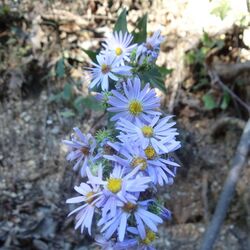Biology:Symphyotrichum anomalum
From HandWiki
Short description: Species of flowering plant in the family Asteraceae native to the north-central United States
| Symphyotrichum anomalum | |
|---|---|

| |
| Scientific classification | |
| Kingdom: | Plantae |
| Clade: | Tracheophytes |
| Clade: | Angiosperms |
| Clade: | Eudicots |
| Clade: | Asterids |
| Order: | Asterales |
| Family: | Asteraceae |
| Tribe: | Astereae |
| Subtribe: | Symphyotrichinae |
| Genus: | Symphyotrichum |
| Subgenus: | Symphyotrichum subg. Symphyotrichum |
| Section: | Symphyotrichum sect. Symphyotrichum |
| Species: | S. anomalum
|
| Binomial name | |
| Symphyotrichum anomalum | |

| |
| Native distribution[3] | |
| Synonyms[2] | |
| |
Symphyotrichum anomalum (formerly Aster anomalus) is a species of flowering plant in the family Asteraceae native to Arkansas, Illinois, Kansas , Missouri, and Oklahoma. Commonly known as manyray aster, it is a perennial, herbaceous plant that may reach 20 to 120 centimeters (3⁄4 to 4 feet) tall. Its flowers have lavender or blue to purple, seldom white, ray florets and cream or light yellow, then pinkish-purple disk florets.[3] Its flowers are attractive to butterflies. The lower leaves have untoothed margins and are heart-shaped at the base.[4]

View of involucres and phyllaries
Citations
References
- Flora of North America Editorial Committee, ed. (2006), "Symphyotrichum anomalum", Flora of North America North of Mexico (FNA), 20, New York and Oxford, http://www.efloras.org/florataxon.aspx?flora_id=1&taxon_id=250067624, retrieved 10 July 2021
- Missouri Botanical Garden (n.d.). "Symphyotrichum anomalum". https://www.missouribotanicalgarden.org/PlantFinder/PlantFinderDetails.aspx?taxonid=291337&isprofile=0&n=1.
- "Symphyotrichum anomalum Many-ray Aster". Arlington, Virginia. 2 July 2021. https://explorer.natureserve.org/Taxon/ELEMENT_GLOBAL.2.161006.
- POWO (2019). "Symphyotrichum anomalum (Engelm.) G.L.Nesom" (in en). Royal Botanic Gardens, Kew. http://www.plantsoftheworldonline.org/taxon/981771-1.
Wikidata ☰ {{{from}}} entry
 |


